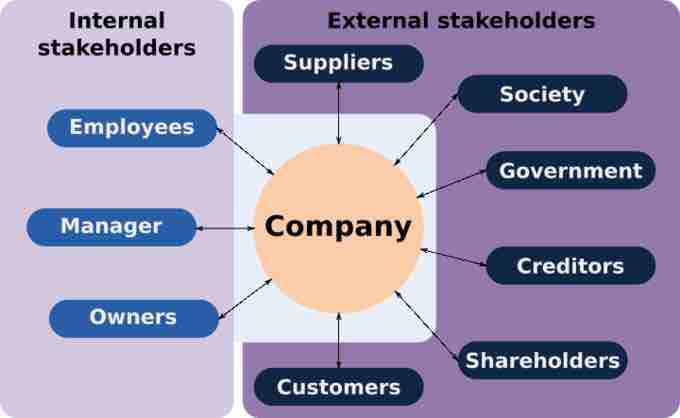Business are complex pieces in the social ecosystem, both impacted by and impacting a wide variety of groups in the external environment. As a leader or manager at an organization, understanding both internal and external stakeholder needs is a central responsibility. Decisions should be made in a way that ensures all stakeholders are considered.
External Stakeholders
There are quite a few external stakeholders for businesses to keep in mind when making decisions and carrying out operations. These include but are not limited to customers, suppliers, creditors, communities, governments, and society at large:
Customers
The primary purpose of providing goods and services is to fill needs. Understanding the needs of an organization's core customer base, and optimizing operations to best fill those needs, is therefore a significant part of managing a business. Interacting with customers through social media, emails, storefronts, user testing groups, and the delivery of services and goods is an important aspect of maintaining a strong community (and a strong sense of what customers want from the organization).
Nowadays, big data plays a significant role in determining what users want. By understanding trends, habits, and trajectories in user data, organizations can anticipate the needs of users and refine their value proposition.
Suppliers
Suppliers and other strategic alliances are interdependent, where the success of one will impact the success of another. As a result, suppliers are closely related to organizations as key external stakeholders. Timely payments, shipments, communication, and operational processes are key to maintaining a strong relationship with this stakeholder group.
Local community
A business can be a great benefit to a community, providing tax money, local access to unique goods and services, jobs, and community development programs. However, a business can also be a drain on a community by increasing traffic, creating pollution, hurting small businesses, and altering real estate prices. As a result, businesses must look at the needs of the community, and ensure that negative repercussions are minimized while community engagement is maximized.
Government
Governments tax businesses, and therefore have a firm stake in their success. Governments can in fact be considered primary stakeholders, considering the profit motive involved. Governments also provide regulatory oversight, ensuring that accounting procedures, ethical practices, and legal concerns are being handled responsibly by business representatives.
Broader Society
As a result of the digital and global economy, a business can have a significant impact on society at large. Companies such as Airbnb and Uber have transformed entire industries, creating dynamically different economies with a wider variety of participants than ever. Walmart has substantially impacted the viability of small businesses in many regions. The food that is sold at fast food chains has huge impacts on global health. Manufacturing facilities in developing nations are transforming entire ecosystems. Social networks are collecting vast amounts of data. All of these concepts aren't intrinsically good or bad, but managing them to ensure outcomes are positive for society as a whole is a critical responsibility.
Other
While other stakeholder groups could be discussed at length, these are a few of the key pillars in stakeholder theory.

Stakeholders
This chart underlines some of the main internal and external stakeholders leaders will consider when looking at the implications of business operations.